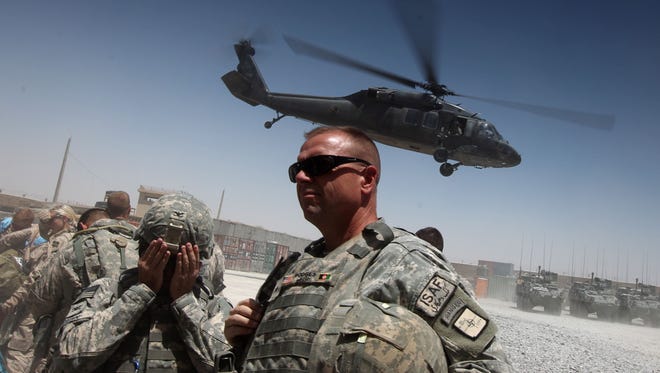Trump's Afghanistan war strategy: Use military to force peace talks with Taliban

WASHINGTON — President Trump vowed to prevail over Taliban insurgents on the Afghanistan battlefield, but his top diplomat acknowledged Tuesday that the war will end at the negotiating table.
“This entire effort is intended to put pressure on the Taliban, to have the Taliban understand you will not win a battlefield victory,” Secretary of State Rex Tillerson said a day after Trump outlined a strategy lacking specifics for concluding a war approaching its 16th anniversary.
Many military experts believe that only a broad political reconciliation between the U.S.-backed Afghan government and Taliban will bring an end to America’s longest war, since an outright victory over the insurgency is unlikely.
But getting the Taliban to the negotiating table will require turning the tide on the battlefield, where Taliban fighters have been expanding the territory they control as U.S. troops have withdrawn from combat. The Pentagon has described the war as a "stalemate."
Afghanistan’s government remains weak, and the Taliban and the Haqqani, another insurgent network, have sanctuary in neighboring Pakistan, making a U.S.-led military victory largely out of reach, said Scott Worden, an analyst at the U.S. Institute for Peace.
The Taliban, while not popular in Afghanistan, does have support in some corners of the country, where there is mistrust for a central government riddled with corruption and dependent on foreign military support.
Trump did not dwell on reconciliation in outlining a new strategy. “Our troops will fight to win,” Trump said in his Monday night speech.
That doesn’t mean the Taliban will be crushed. Trump did not define "win" except to say he would not allow Afghanistan to be a safe haven for terrorists again. President George W. Bush ordered an invasion in October 2001 to topple a Taliban regime because it harbored the al-Qaeda plotters of the 9/11 attacks.
Tillerson said continued military operations are designed to convince the Taliban leaders that they will not prevail on the battlefield, and if they want to survive they need to talk with Afghanistan's government.
“We may not win one, but neither will you,” Tillerson said. “So at some point, we have to come to the negotiating table and find a way to bring this to an end."
Peace talks and other reconciliation efforts over the years have largely faltered. The Afghan government has at times balked at direct talks with the radical Islamic group in the past, and recent military successes have made the Taliban less willing to negotiate a political settlement.
The Taliban has captured districts and villages as the U.S.-backed security forces have suffered high casualties.
Afghanistan's government has expressed a willingness now to hold talks with Taliban leaders. The United States is prepared to facilitate such talks. "We stand ready to support peace talks between the Afghan government and the Taliban without preconditions," Tillerson said.
Trump’s strategy clears the way for an increase of several thousand U.S. advisers to support Afghan security forces. Currently the U.S. military has deployed about 8,400 U.S. troops to Afghanistan, but none in conventional combat roles.
Trump has also said he will expand the authority of field commanders to order U.S. air power and other support.
Trump’s strategy of increasing military pressure and removing any deadlines for U.S. troop withdrawal may present an opportunity for new diplomatic initiatives, Worden said.
President Barack Obama had set a schedule for U.S. troop withdrawals, which gave the Taliban an incentive to be patient until the U.S. exit date.
Trump said any withdrawal would be based on security conditions. “America’s enemies must never know our plans or believe they can wait us out,” Trump said.
Trump said his strategy also calls for increased pressure on Pakistan, whose cooperation is considered essential in bringing about political reconciliation with the Taliban.
Pakistan’s powerful intelligence agency has historic ties with the Taliban and influence over its leadership. “Pakistan in particular can play an important role here, certainly in delivering the Taliban to the negotiating table,” Tillerson said.
“It’s time to begin a process — it may very well be a lengthy process — of reconciliation and a peace accord,” he said.
More:Pakistan's ambassador: We want to work with Trump to end war in Afghanistan
More:Analysis: Trump's new Afghanistan war strategy reflects a lack of winning options
More:Cautioning against 'hasty' pullout from Afghanistan, Trump clears path for more U.S. troops
More:Analysis: Trump reverses views on Afghanistan, a war with no easy exits
More:Promoter of privatizing Afghan war loses out to generals